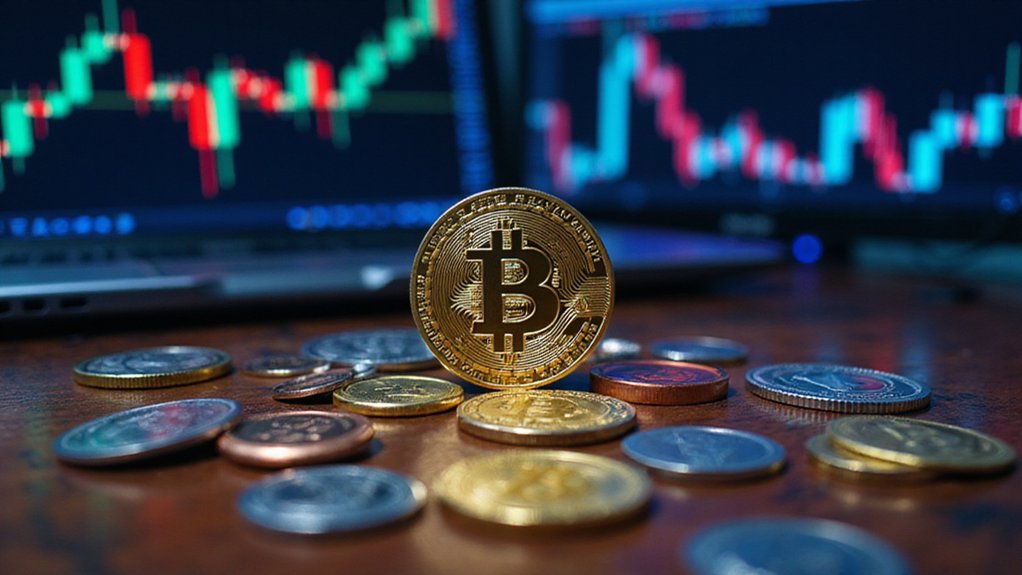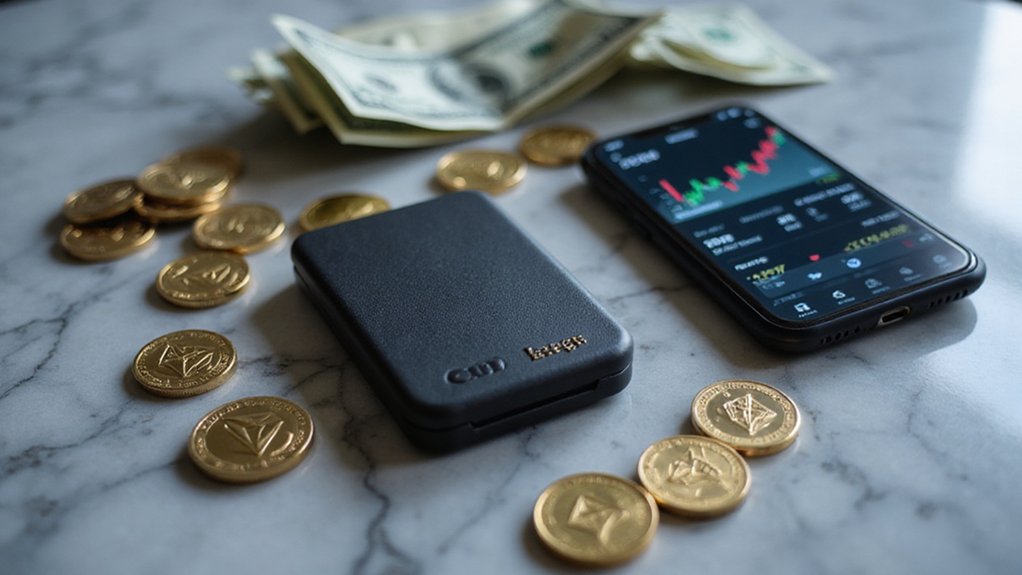Digital securities are blockchain-based tokens representing traditional financial instruments—stocks, bonds, real estate, and fund shares—that maintain full regulatory compliance while leveraging distributed ledger technology for enhanced efficiency. These digitally recorded ownership rights utilize smart contracts for automated compliance, enable fractional ownership, and facilitate real-time settlement across borders. Applications span private securities offerings to tokenized real estate, with institutional adoption driving exponential market growth despite traversing labyrinthine regulatory frameworks that would challenge even seasoned compliance officers.

The revolution in capital markets has arrived not with the dramatic flourish one might expect from decades of promises about blockchain disruption, but rather through the methodical digitization of securities—those fundamental building blocks of investment that have stubbornly remained analog in an increasingly digital world.
Digital securities represent digitally recorded ownership or rights to assets, built upon blockchain or distributed ledger technology that offers the holy trinity of modern finance: transparency, traceability, and immutability of records.
Digital securities deliver blockchain’s holy trinity—transparency, traceability, and immutability—finally dragging asset ownership into the modern era.
These instruments encompass various asset classes, from equity and debt to real estate and fund shares, all unified by their reliance on blockchain as the primary source of truth.
Smart contracts automate compliance and execution (because apparently humans cannot be trusted with basic arithmetic), while cryptographic protection provides security that would make Fort Knox envious.
The technology enables direct peer-to-peer transfers across borders, facilitating real-time settlement that makes traditional T+2 settlement cycles appear positively medieval.
The taxonomy includes equity tokens representing company shares, debt tokens functioning as digital bonds, asset-backed tokens tied to physical assets like real estate, and fund tokens serving as digital investment fund shares.
Each variant must navigate the labyrinthine regulatory landscape, adhering to existing securities regulations enforced by agencies like the SEC and ESMA, while complying with Know Your Customer and Anti-Money Laundering requirements that remain stubbornly analog in their bureaucratic complexity.
The benefits prove compelling: reduced issuance and transaction costs, increased accessibility and liquidity, global 24/7 trading opportunities, and enhanced regulatory compliance.
Digital securities enable fractional ownership, democratizing access to investment opportunities previously reserved for institutional players with seven-figure minimums. The tokenization process begins with off-chain standardization where asset details and legal documentation are verified before creating digital tokens on the blockchain.
Current applications span private securities offerings on blockchain platforms, tokenized real estate for fractional investment, and corporate bonds issued digitally. The underlying blockchain infrastructure eliminates single point failure through its distributed network architecture, ensuring robust system resilience. Notably, the Protos Fund exemplifies this evolution as the first licensed tokenized hedge fund trading on a US Alternative Trading System.
Venture capital firms increasingly utilize security tokens for startup funding, while secondary markets emerge for digital securities trading.
The market trajectory suggests exponential growth as traditional finance reluctantly embraces blockchain technology.
Institutional investors, initially skeptical of anything bearing the “crypto” moniker, now seek the efficiency and transparency these instruments provide, fundamentally redefining capital market infrastructure and spurring innovation in financial products that may finally justify decades of blockchain evangelism.
Frequently Asked Questions
What Are the Tax Implications of Investing in Digital Securities?
Digital securities investors face the IRS’s predictably unforgiving property taxation framework, where each transaction triggers potential capital gains or losses based on holding periods and acquisition costs.
Short-term gains endure ordinary income rates, while long-term positions enjoy preferential treatment—assuming one survives the recordkeeping gauntlet.
The agency’s evolving reporting requirements demand meticulous documentation of every trade, because apparently traditional securities weren’t complicated enough without adding blockchain’s delightful opacity to investment taxation.
How Do Digital Securities Differ From Traditional Cryptocurrencies Like Bitcoin?
Digital securities represent tokenized traditional assets (stocks, bonds, real estate) operating on regulated, permissioned blockchains with mandatory compliance protocols, while Bitcoin functions as a decentralized commodity on public ledgers without central oversight.
Unlike Bitcoin’s pseudonymous transactions designed for value transfer, digital securities require KYC verification and offer fractional ownership of real-world assets.
The former prioritizes regulatory compliance; the latter champions financial independence—fundamentally different philosophical approaches to blockchain technology.
What Happens if I Lose Access to My Digital Wallet?
Losing digital wallet access typically means permanent asset forfeiture—a sobering reality affecting roughly $140 billion in stranded Bitcoin alone.
Recovery hinges on preparation: seed phrases serve as master keys, while some wallets offer alternative methods like QR codes or social recovery through trusted parties.
Without proper backups or recovery mechanisms, investors face complete financial loss, transforming their digital holdings into cryptographic artifacts—accessible in theory, unreachable in practice.
Are Digital Securities Insured Against Theft or Technical Failures?
Digital securities can indeed be insured against theft and technical failures, though coverage varies considerably by provider and policy terms.
Insurance typically protects against hacking, unauthorized transfers, smart contract exploitations, and even physical theft of cold storage devices.
However, given that crypto-related losses hit $2.2 billion in 2024, one might wonder if insurers are pricing these policies correctly—or if they’re simply hoping lightning doesn’t strike twice.
Which Countries Have Banned or Restricted Digital Securities Trading?
Several countries maintain outright bans on digital securities trading, including Algeria, Bangladesh, Bolivia, Egypt, and Afghanistan—each citing financial stability concerns that range from legitimate to seemingly paranoid.
Partial restrictions exist in Turkey, Morocco, China, Saudi Arabia, and Iraq, where governments apparently believe they can selectively embrace blockchain innovation while avoiding its inherent disruption.
Underground trading persists regardless, because markets—unsurprisingly—resist bureaucratic containment.









